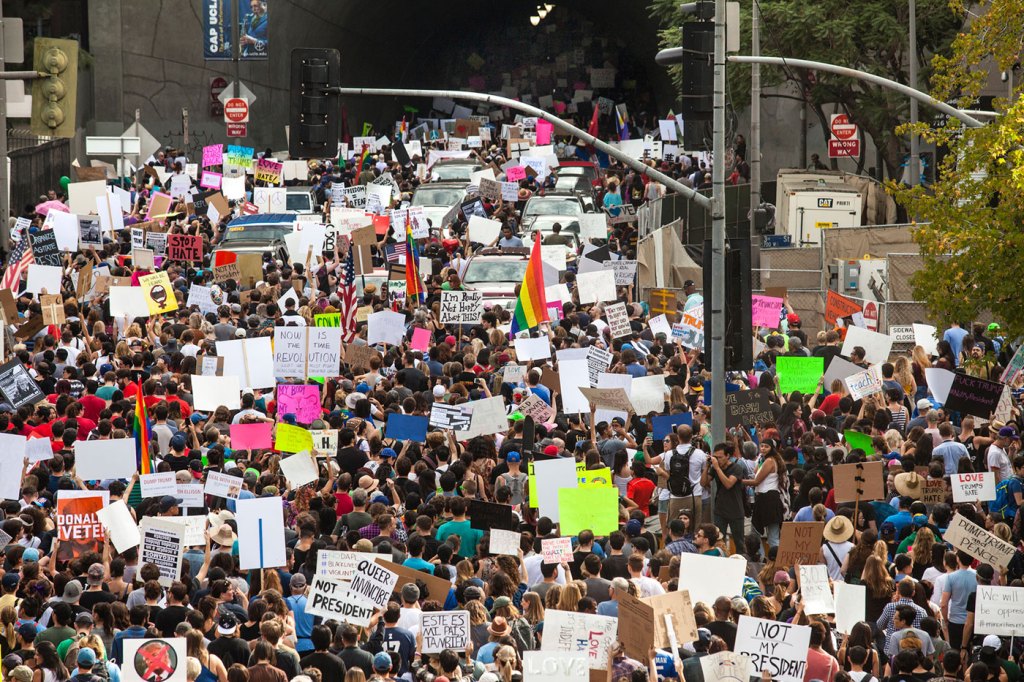Recent protests ‘playing an important role in the democratic process’

In the days since Election Day, crowds have gathered across the nation to protest the election of Donald J. Trump as president. These are not the first sociopolitical movements we’ve seen in recent years, nor are they without historical precedent.
We spoke with Sarah J. Jackson—assistant professor of communication studies and an expert in how social and political identities are debated in the public sphere—about these recent social and political movements and their potential impact.

Sarah J. Jackson, assistant professor of communication studies. Photo by Skylar Shankman/for Northeastern University
From your perspective, what do protesters hope to achieve?
In moments of political and social crisis, protest serves as one form of deliberative democracy. Yes, a healthy media can highlight deliberations between and among citizens, and yes, voting and support of policy might be the result of deliberation, but ultimately protest is the most grassroots and naturally occurring form of deliberative democracy because citizens can engage in it without the blessing or methods of political and media institutions and elites. Protests erupt, in fact, when citizens feel like other avenues of debate have been foreclosed to them. So when we think about one of the very first protests in American history—the dumping of tea into Boston Harbor by who the British regarded as an unruly mob—we see a form of deliberative democracy that allowed citizens to make an important symbolic point to both those in power who sought to silence them and to other citizens still deciding which side to take in the revolution.
What impact do you think these protests will have on Trump’s presidency and on the nation as a whole? Given the electorate’s deep division, what sort of influence do these types of protests actually have?
Protests, in fact, often bring people together. One of the primary roles of protest is solidification—which is the strengthening of the perspective of those who are like-minded. At the same time, protest serves as a form of promulgation—it extends information and ideas to those who are perhaps not already of the same mind as protesters and invites them into that process of democratic deliberation. Healthy democracies cannot exist without protest, which is why totalitarian and fascist governments throughout history have often sought to silence, and sometimes even kill, protestors. It is impossible to say for certain what specific influence these and other protests will have on Trump’s presidency and the nation as a whole, but what is certain is that they are playing an important role in the democratic process and will likely push both politicians and citizens to think about solutions that can bring those agitating for various causes together.
We’ve seen several broad sociopolitical movements in recent years, including the Black Lives Matter and Occupy Wall Street movements. Do you see any similarities among these and other recent movements? Do you see any connection between these movements and the protests this past week?
As a scholar of social movements, it is hard to say that one historical moment of social upheaval is special compared to others, but what I will say is that the activism of the past several years in America, beginning with protests against the Iraq War, and including Occupy Wall Street, Black Lives Matter, and current presidential protests, reminds me of the mood of the nation in the 1960s. Americans were deeply divided over civil rights issues and the war in Vietnam with some calling for extended rights for African Americans and an end to what they saw as an unjust war and many others (in fact the majority) resisting the causes of the civil rights movement and student anti-war activists. Of course we know in retrospect that eventually the majority of the nation came to agree with the protestors on civil rights and the war in Vietnam, but this change in attitude took a very long time and a lot of protest to achieve.
What is certain is that they are playing an important role in the democratic process and will likely push both politicians and citizens to think about solutions that can bring those agitating for various causes together.—Sarah J. Jackson, assistant professor of communication studies
For historical context, are there any other striking similarities or differences between more recent movements and the Vietnam War protests you mentioned? Are these recent protests simply part of a rise in sociopolitical activism, or is this a new era in activism?
I do not see the current moment as a new era of activism so much as a reflection of the reality that progress in every society ebbs and flows and that social movements face inevitable backlash. Many political and social scientists have argued that while the 1950s to 1970s represent a huge progressive shift in American politics that included civil rights, women’s rights, and anti-war activism, by the 1980s and 1990s our society had integrated some of that progress while also beginning a backlash against it that resulted in social policies like those that led to mass incarceration. Many suggest that the current moment is similar, that in the 21st century we have seen some progressive shifts in social inclusion and on social issues, for example on LGBTQ rights, and that the election of Trump is a part of a backlash to this. Of course to activists, then, the only logical next step is to push back.





